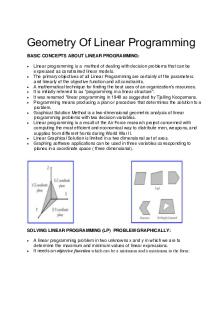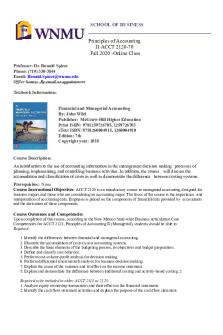Principles of Programming - ZZEN9021 - H6 2020 PDF

| Title | Principles of Programming - ZZEN9021 - H6 2020 |
|---|---|
| Course | Principles of Programming |
| Institution | University of New South Wales |
| Pages | 5 |
| File Size | 296.8 KB |
| File Type | |
| Total Downloads | 14 |
| Total Views | 144 |
Summary
Summary of course content...
Description
Faculty of Engineering
School of Computer Science and Engineering
ZZEN9021 Principles of Programming Hexamester 6 2020
Course Outline
Description The aim of the course is to provide you with a solid foundation in fundamental programming concepts and principles, and to become proficient in the programming language Python. You will learn to design solutions to a broad range of problems and implement those solutions in the form of small to medium programs, using appropriate programming techniques and tools. The course covers the following essentials: program design and implementation in a high-level language, with procedural and object-oriented constructs and some functional features; fundamental programming techniques, debugging and testing; simulation; applications in different areas, including those involving graphical representations, plotting in particular.
Units of Credit The course is worth 6 units of credit.
Learning Outcomes On successful completion of the course, you should be able to: 1. Design and implement algorithmic solutions to problems that require writing Python programs. 2. Demonstrate an understanding and a good command of programming techniques that borrow from the procedural, functional and object-oriented paradigms. 3. Accomplish and demonstrate a variety of programming tasks for a broad range of applications; analyse data, plot data and run simulations. 4. Acquire and demonstrate the discipline to follow a rigorous and methodical approach in program design and development, with attention given to effective debugging and testing.
Schedule Date
Week
Topic
19 Oct
0
Orientation Week
26 Oct
1
Python fundamentals
2 Nov
2
Lists, tuples, sets, and dictionaries
Week 1 quiz and programming task
9 Nov
3
Functions, classes, and modules
Week 2 quiz and programming task
16 Nov
4
Manipulating data with pandas
Week 3 quiz and programming task
23 Nov
5
Visualising data with Matplotlib
Week 4 quiz and programming task
30 Nov
6
Working with Jupyter notebooks
Week 5 quiz and programming task
7 Dec
7
Exam Week
Week 6 project
2
ZZEN9021 Principles of Programming, Hexamester 6 2020
Assessment Due
Assessment In order to pass the course, you must: • •
achieve a total mark of at least 50; meet any additional requirements of the assessment tasks.
The assessment tasks are: No.
Type
Weight
1
Week 1: Quiz: 10 percent, programming task: 5 percent
2
Week 2: Quiz: 10 percent, programming task: 5 percent
15%
3
Week 3: Quiz: 10 percent, programming task: 5 percent
15%
4
Week 4: Quiz: 10 percent, programming task: 5 percent
15%
5
Week 5: Quiz: 10 percent, programming task: 5 percent
15%
6
Week 6: Project
25%
15%
Due*
Learning Outcomes
5 pm Monday, Week 2 (2 Nov)
1,2,3,4
5 pm Monday, Week 3 (9 Nov)
1,2,3,4
5 pm Monday, Week 4 (16 Nov)
1,2,3,4
5 pm Monday, Week 5 (23 Nov)
1,2,3,4
5 pm Monday, Week 6 (30 Nov)
1,2,3,4
5 pm Monday, Week 7 (7 Dec)
1,2,3,4
*All dates and times are Sydney (Australia) dates and times
Teaching Staff Your teaching staff are: • •
Rachid Hamadi, [email protected] (Course Convenor) Additional teaching staff may be introduced on the course website.
Teachers are your main point of contact. Their consultation times will be advised on the course website.
Resources The website for the course is on Moodle, at: http://moodle.telt.unsw.edu.au. All readings and activities can be accessed via the course website - no additional materials are required.
Technical Requirements The course is fully online. You will need: • • • • •
A fast and reliable computer (or equivalent device), with an up-to-date operating system A fast and reliable internet connection The latest version of a modern browser (e.g. Internet Explorer, Chrome, Firefox or Safari) A reliable way to store your files - either on your computer with a backup routine, or in the cloud (e.g. using Dropbox) There is no specific software requirement as all activities can be done in Ed, though students might prefer to work locally, in which case they would need to install the latest version of Python IDE such as Spyder, PyCharm or IDLE as well as Jupyter Notebook tool.
3
online.unsw.edu.au
Learning and Teaching Activities The course contains a variety of resources and activities that are carefully designed to enhance your learning. Some activities require you to work and think alone, by reading some text, listening to a recording or watching a video. You might be asked to engage with the material and explore interactive elements by clicking to reveal content, to help you better absorb and process the concepts. Some activities require you to produce work of your own. You might be answering a question, writing code to solve a problem, or posting to a forum, for example. Some activities are assessment tasks, which have been carefully designed to measure how well you have achieved the learning outcomes of the course. Typically, you will get feedback on your work, either from yourself (by checking your work with models that are provided), or from an automatic marking process, or from your peers, or from your teacher. You also have access to a variety of ways to communicate with your peers and with the teaching staff. The general discussion forums are a place for you to ask and answer questions, to interact with your peers, and to be challenged by your teachers. Getting involved in these forums will enhance your learning experience and make it more enjoyable. Your course may include webinars, which provide an opportunity to hear directly from your Online Lecturers and ask questions in real time. All webinars are recorded so you can access them at any time. Online Lecturers are available for consultations and will post information about how to access consultations on the course website. You can also contact your Online Lecturer by email using the email address in the teaching staff section of this outline. It is up to you how much work you do. The more time and effort that you can dedicate to the course, the better will be your learning and your results.
Special Consideration If illness or other circumstances beyond your control interfere with your assessment performance then you can apply for special consideration, to get an extra opportunity to demonstrate your level of performance. You must make your application online, through the Special Consideration portal on myUNSW. Do not apply to your course teaching staff - they will be notified automatically. You must apply before the assessment task is due or the exam is held - if you submit the assessment or sit the exam then you are declaring yourself well enough to do so and are unable to subsequently apply for special consideration. If illness or misadventure prevent you from applying in advance, then you must apply as soon as possible, and provide evidence that you could not apply sooner. If you become unwell on the day of the exam, you must provide evidence dated within 24 hours of the exam, with your application. Your application will be considered centrally, by a case review team, and they will notify you of the outcome. If your application is successful, then your course teaching staff will arrange an alternative assessment for you. You can read more about special consideration at: https://student.unsw.edu.au/special-consideration.
4
ZZEN9021 Principles of Programming, Hexamester 6 2020
Academic Integrity UNSW values academic integrity and has strict rules against cheating. In particular, it has strict rules against trying to get credit that you don’t deserve. Thus, you should not plagiarise - i.e. present someone else’s work as if it’s your own. This could be the work of an academic, or a peer, or a contract writer, and it includes work of all kinds - exact words, general ideas, designs, drawings, software, and so on. Nor should you recycle your own work - i.e. submit it for credit in multiple courses. UNSW also has strict rules against helping others to cheat - e.g. by giving someone your work to copy, or doing someone’s work for them, and so on. For further information about academic integrity and plagiarism at UNSW go to: https://student.unsw.edu.au/plagiarism For information about acknowledging your sources and referencing go to: https://student.unsw.edu.au/referencing. If you are not sure what referencing style to use in this course, you should ask your Online Lecturer.
Evaluation and Development Toward the end of the hexamester you will be asked to give feedback about the course, via UNSW’s MyExperience survey. Your feedback will be used, along with feedback from other stakeholders, to help improve the course. You can also contact your Course Convenor any time you have suggestions or other feedback.
Quality Assurance UNSW actively monitors student learning and quality of the student experience in its programs. A random selection of completed assessment tasks may be used for quality assurance, such as determining the extent to which program learning goals are being achieved. The information is required for accreditation purposes, and aggregated findings will be used to inform changes aimed at improving the quality of programs. All material used for such processes will be treated as confidential.
5
online.unsw.edu.au...
Similar Free PDFs

H6 Membraanpotentiaal
- 6 Pages

H6 Ryan Air uitwerkingen
- 3 Pages

Marketing principles week6 2020
- 10 Pages

H6 - HOOFDSTUK 6
- 21 Pages

Dierkunde H6 - Porifera
- 3 Pages

Geometry Of Linear Programming
- 6 Pages

Summary of Java Programming
- 10 Pages
Popular Institutions
- Tinajero National High School - Annex
- Politeknik Caltex Riau
- Yokohama City University
- SGT University
- University of Al-Qadisiyah
- Divine Word College of Vigan
- Techniek College Rotterdam
- Universidade de Santiago
- Universiti Teknologi MARA Cawangan Johor Kampus Pasir Gudang
- Poltekkes Kemenkes Yogyakarta
- Baguio City National High School
- Colegio san marcos
- preparatoria uno
- Centro de Bachillerato Tecnológico Industrial y de Servicios No. 107
- Dalian Maritime University
- Quang Trung Secondary School
- Colegio Tecnológico en Informática
- Corporación Regional de Educación Superior
- Grupo CEDVA
- Dar Al Uloom University
- Centro de Estudios Preuniversitarios de la Universidad Nacional de Ingeniería
- 上智大学
- Aakash International School, Nuna Majara
- San Felipe Neri Catholic School
- Kang Chiao International School - New Taipei City
- Misamis Occidental National High School
- Institución Educativa Escuela Normal Juan Ladrilleros
- Kolehiyo ng Pantukan
- Batanes State College
- Instituto Continental
- Sekolah Menengah Kejuruan Kesehatan Kaltara (Tarakan)
- Colegio de La Inmaculada Concepcion - Cebu








